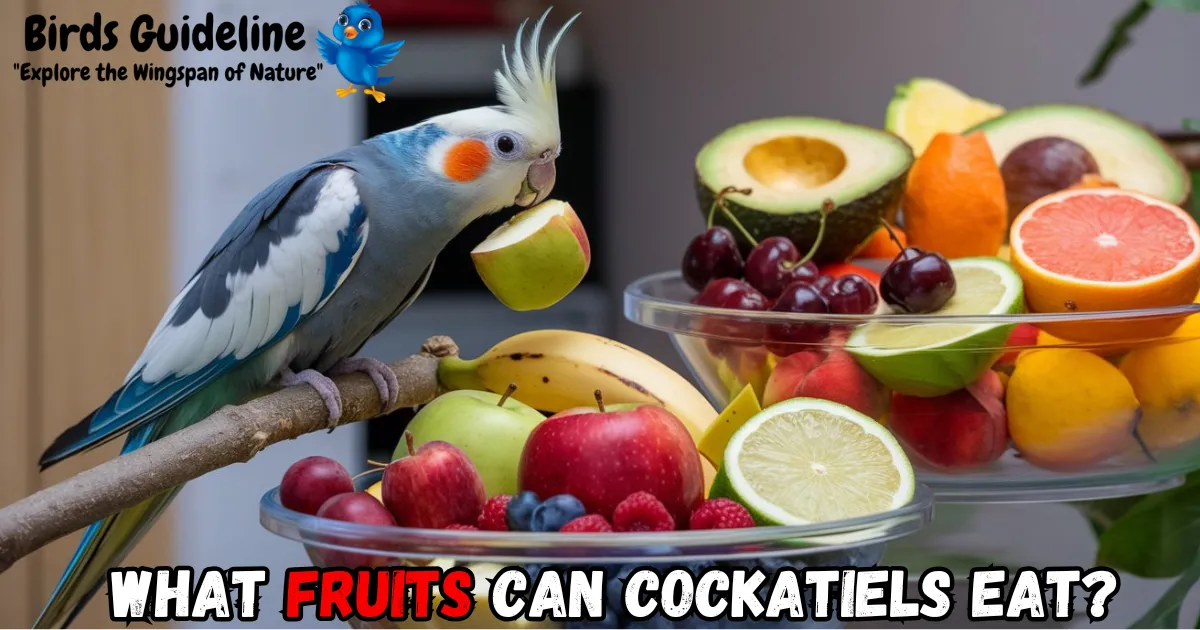Cockatiels’ Dietary Guidelines
Feeding your feathery buddy right is not just about filling up their bowl. It’s about making sure they live a long, happy, and healthy life.
Balanced Diet Essentials
Cockatiel menus aren’t just about seeds! According to those big-feathered brains over at the Association of Avian Veterinarians, a cockatiel’s plate should be about 60-70% pellets. Why? ‘Cause pellets pack all those essential nutrients under one roof and keep our little pals from going overboard on seeds (Quora). Toss in some fresh fruits and veggies—about 20-25% of their diet for a vitamin kick and to keep things ‘regular.’
| Diet Component | Percentage of Total Diet |
|---|---|
| Pellets | 60-70% |
| Fresh Fruits and Vegetables | 20-25% |
| Seeds and Nuts | 5-10% |
Pellets are like little health nuggets, warding off nasties like liver issues and unwanted pounds. For the freshest pick, apples and carrots are topnotch, while watermelon brings an extra symphony of yum. Got any questions? Peek into cockatiel diet for the full scoop.
Variety in Nutrition
Mixing it up is the spice of life—and meals! Changing things up with a splash of nuts like almonds and legumes like lentils adds a protein pop and some good-for-your-feathers fats (Quora).
Next up on the menu: romaine lettuce, nori seaweed, and organic hemp seeds are no strangers to a top-class seed mix. Just remember, nobody likes a pesticide surprise, so give any veggies a rinse. Bulk buyer tip: freeze ’em when you’ve got too much to munch.
Need more tips and tricks? Our cockatiel care article can clue you in on feeding hacks.
Offering a variety of tastes and textures keeps your pet chirping and chipper. Want more info on fruit-specific needs, like whether watermelon is a yay or nay? Catch our guide on can cockatiels eat watermelon for the full fruity lowdown.
Safe Fruits for Cockatiels
Watermelon Inclusion
Cockatiels can totally munch on watermelon without worry. It’s like a double whammy of hydration and vitamins—talk about a win-win! But don’t go overboard; keep it a moderate treat to ensure your feathered buddy gets a balanced menu. Watermelon is especially cool when it’s sizzling outside because it helps with hydration and gives your bird a fruity lift.
This juicy fruit brings a bunch of nutrients to the table, such as vitamins A, C, and B6, plus potassium and magnesium. But remember, it’s just one piece of the puzzle—mix it up with other safe fruits and veggies to keep things interesting and nutritious.
For more details on what to feed your cockatiel, head over to our cockatiel diet guide.
| Nutrient | Amount per 100g |
|---|---|
| Calories | 30 |
| Vitamin A | 569 IU |
| Vitamin C | 8.1 mg |
| Vitamin B6 | 0.04 mg |
| Potassium | 112 mg |
| Magnesium | 10 mg |
Seed Safety Assessment
Let’s talk seeds—are they safe for your bird? Well, according to Birdtricks, watermelon seeds are A-okay for cockatiels. They won’t give your bird any grief, so feel free to leave ’em in there.
Of course, seed safety is a big deal because some seeds pack a nasty punch. Stay clear of seeds from apples, apricots, and especially avocados—these can be toxic. Avocado seeds are the worst offenders, containing persin, which is a harmful toxin for our bird friends (PangoVet).
Check out our toxic foods to avoid page for more info on what to skip in your cockatiel’s diet.
Safe Seeds for Cockatiels
| Fruit | Seed Safety |
|---|---|
| Watermelon | Safe |
| Grapes | Safe |
| Cantaloupe | Safe |
| Oranges | Safe |
Keeping your cockatiel’s diet safe and nutritious is key to their happiness. For more on stepping up your bird’s meal game, peep our article on feeding cockatiels responsibly.
Toxic Foods to Avoid
Harmful Foods List
When you’re taking care of a cockatiel, knowing which snacks could send them into a tailspin is key. Some eats can really mess them up or worse. Let’s break down what’s off-limits:
| Toxic Food | Potential Harm |
|---|---|
| Avocado | Contains persin, which can cause heart failure, breathing problems, even sudden death. Watch out! (Avian and Exotic Veterinary Practice) |
| Chocolate | Loaded with caffeine and theobromine; think nasty stuff like vomiting, hyperactivity, or seizures—yikes! (Avian and Exotic Veterinary Practice) |
| Onions | Can bust up red blood cells like they’re going out of style, causing anemia. (Avian and Exotic Veterinary Practice) |
| Garlic | Has allicin, an anemia-inducing hazard, though rare. Better safe than sorry. (Avian and Exotic Veterinary Practice) |
| Salty Foods | Throwing off that precious electrolyte balance, leading to dehydration, kidney, and heart issues. (Avian and Exotic Veterinary Practice) |
| Fatty Foods | Can clog arteries faster than you can say “heart disease” or “stroke.” (Avian and Exotic Veterinary Practice) |
Thinking how to keep your cockatiel chirpy and healthy? Peek at our guide on cockatiel care. They’ve got the lowdown on maintaining a safe and happy diet for your little winged buddy.
Poisonous Fruit Items
Fruits can be awesome for cockatiels, but uh-oh—some are wolf in sheep’s clothing. A few sneaky fruits and pits can be downright dangerous. Here’s the scoop:
| Poisonous Fruit Item | Harmful Component | Effect |
|---|---|---|
| Apple Seeds | Cyanide | Packs a cardio-toxic punch that can be deadly. (Avian and Exotic Veterinary Practice) |
| Cherry Pits | Cyanide | Another cyanide culprit, equally bad news. (Avian and Exotic Veterinary Practice) |
| Peach Pits | Cyanide | Same cyanide horror story, avoid at all costs. (Avian and Exotic Veterinary Practice) |
| Plum Pits | Cyanide | Do I really need to say it again? Just no. (Avian and Exotic Veterinary Practice) |
| Pear Seeds | Cyanide | Another seed trying to play rough. Steer clear. (Avian and Exotic Veterinary Practice) |
Want to feed your bird right? Drop by our pages on feeding cockatiels responsibly and cockatiel treats.
Keeping these baddies out of their dish keeps your feathery friend outta danger. For solid info on balanced meals, make a pit-stop at cockatiel diet.
Feeding Cockatiels Responsibly
Keeping your cockatiel’s diet on point means they’re getting the right fuel for those aerial antics and charming chatter. Nailing their nutrition is all about knowing how much watermelon is okay and making sure they get a balanced plate of grub.
Getting the Fruit Fit
Fresh fruits are a tasty treat that’s great for cockatiels, but serving them right can make all the difference:
- Give it a Good Rinse: Spray off any gunk or pesticides on that watermelon. You wouldn’t skip washing your own apples, would you?
- Keep it Chill, Not a Watermelon Feast: Watermelon’s tasty and all, but it’s more like their candy, not dinner. Too much of that sweet stuff can mess with their usual eats.
- Bye-Bye Seeds: Yeah, they might munch on seeds, but skip the choking hazards and go seedless when cutting up the melon.
- Chop to Bite-Size Awesomeness: Small, chewable chunks are where it’s at. Makes it simpler for your little bird buddy to feast without fuss.
Following these tips makes sure your bird kid stays happy and healthy, one nibble at a time.
Balancing Their Birdy Plate
To keep your feathered friend peppy and pretty, balance what’s on their plate. Check out what the bird docs suggest:
| Food Type | Percentage of Diet |
|---|---|
| Pellets | 60-70% |
| Fresh Fruits and Veggies | 20-25% |
| Seeds and Grains | 5-10% |
This mix is like birdie fuel to keep them zooming around and looking gleaming. Toss in different foods to keep their beaks interested and energy buzzing. Curious about other fruits? Peek at our chats on bananas, grapes, and apples.
Sample Day Menu
Wanna know what a day of eating looks like for your cockatiel? Look here:
| Meal | Food Item | Quantity | Notes |
|---|---|---|---|
| Breakfast | Pellets | 1-2 tbsp | Main course magic |
| Mid-Morning Snack | Fresh Melon | 1-2 bits | Skip the seeds |
| Lunch | Leafy Greens | 1 tbsp | Carrots, spinach work! |
| Afternoon Treat | Mixed Seeds | 1 tsp | Just a nibble, not the meal |
| Dinner | Pellets | 1-2 tbsp | Wind down feast |
A diet done right means a happy squawky friend with no vet visits needed. For loads more on keeping them chirpy, fly by our reads on cockatiel care and cockatiel feeding basics.

